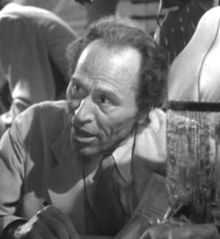William Edmunds (actor)
| William Edmunds | |
|---|---|
 William Edmunds in Casablanca (1942) | |
| Born |
Guillermo Bocconcini July 15, 1886 San Fele, Italy |
| Died |
December 7, 1981 (aged 95) Los Angeles, California, U.S. |
Cause of death | Natural Causes |
| Occupation | Actor |
| Years active | 1910–1959 |
William Edmunds (July 15, 1886 – December 7, 1981) was an Italian stage and screen character actor, typically playing roles with heavy accents (generally Italian, Spanish, and French), most notable as Mr. Martini in It’s a Wonderful Life.[1]
Life and Career
Born as Guillermo Bocconcini in San Fele, in the Italian region of Basilicata, although records show that his real name was almost certainly Michael Frondino Pellegrino [2] he emigrated to the United States and was a New York City based actor, receiving his first credited role in the Bob Hope film Going Spanish (1934). He relocated to Hollywood in 1938 and had bit parts in films such as Idiot's Delight (1939), and larger roles such as House of Frankenstein (1944, as gypsy leader Fejos), Bob Hope's Where There's Life (1947, as King Hubertus II) and Double Dynamite (1951, as Groucho Marx's long-suffering boss). His many short subject appearances include a few stints as Robert "Mickey" Blake's father in the Our Gang series.[3] He has a brief appearance in Casablanca (1942) where in Rick’s Café he gives instructions to a man seeking illegal passage out of Casablanca.
Edmunds was cast with Jimmy Stewart in three films, The Mortal Storm, The Shop Around the Corner (1940), and perhaps his signature role as Giuseppe Martini, the bar proprietor in It’s a Wonderful Life. He had other notable parts in For Whom the Bell Tolls (1943), The Three Musketeers (1948), and The Caddy (1953), a Dean Martin and Jerry Lewis comedy. Edmunds received top billing in the 1951 TV situation comedy Actors' Hotel.[4]
He acted on Broadway in such plays as The New York Story and Follies, which he left to be in It’s a Wonderful Life.[5] Additional stage credits include Salt Water (1929–1930), Saluta (1934), Moon Over Mulberry Street (1935–1936), and Siege (1937).[6]
Edmunds died in Los Angeles, California, at age 95. He was cremated and his ashes were scattered at sea.
Filmography
- Going Spanish (1934)
- Idiot's Delight (1939)
- Fixer Dugan (1939)
- Everything Happens at Night (1939)
- The Shop Around the Corner (1940)
- Know Your Money (1940)
- The Mortal Storm (1940)
- Mr. & Mrs. Smith (1941)
- Baby Blues (1941)
- Knockout (1941)
- Barnacle Bill (1941)
- Man at Large (1941)
- Paris Calling (1941)
- The Wife Takes a Flyer (1942)
- The Big Shot (1942)
- The Pied Piper (1942)
- Berlin Correspondent (1942)
- Casablanca (1942)
- Assignment in Brittany (1943)
- For Whom the Bell Tolls (1943)
- There's Something About a Soldier (1943)
- Till We Meet Again (1944)
- The Climax (1944)
- House of Frankenstein (1944)
- Dangerous Passage (1944)
- A Bell for Adano (1945)
- Anna and the King of Siam (1946)
- Swamp Fire (1946)
- It's a Wonderful Life (1946)
- The Beast with Five Fingers (1946)
- The Man I Love (1947)
- The Lost Moment (1947)
- Where There's Life (1947)
- The Three Musketeers (1948)
- The Big Sombrero (1949)
- Ringside (1949)
- Mr. Soft Touch (1949)
- The Lawless (1950)
- Actors Hotel (1951)
- Double Dynamite (1951)
- The Caddy (1953)
- 77 Sunset Strip (1 episode, 1959)
References
- ↑ Michael Willian. The Essential It's a Wonderful Life: A Scene-By-Scene Guide to the Classic Film. Chicago Review Press, 2006 ISBN 1-55652-636-9
- ↑ U.S. World War I Draft Card of Michael Fondonia Pellegrino, in parentheses Pellegrino states that his stage name is William Edmunds
- ↑ Hal Erickson, All Movie Guide
- ↑ Studios Object but Film Stars Flock to Video. Chicago Tribune. October 21, 1950.
- ↑ Of Local Origin. The New York Times. July 26, 1941.
- ↑ "Internet Broadway Database > William Edmunds". Retrieved December 28, 2009.